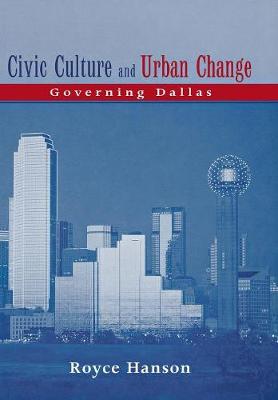Civic Culture and Urban Change analyzes Dallas government's adaptation to shifts in the city's demography and economic structure that occurred after the assassination of President John F. Kennedy in 1963. The book examines civic culture as a product of a governing regime and studies the constraints civic culture has placed on the city's capacity to adapt to changes in its population, economy, and distribution of political power. Royce Hanson traces the impact of civic culture in Dallas on the city's handling of major crises in education, policing, and management of urban development over the past forty years and shows the reciprocal effect of responses to crises on the development of civic capital. Hanson relates the city's civic culture to its economic history and political institutions by following the progression of Dallas governance from business oligarchy to regency of professional managers and federal judges. He studies the city's responses to school desegregation, police-minority conflicts, and other issues to illuminate the role civic and organizational cultures play in shaping political tactics and policy. Hanson builds a profile of political life in Dallas that highlights the city's low voter turnouts, sparse civic and political networks, and relative lack of multiracial institutions and mechanisms. Civic Culture and Urban Change summarizes the ""solution sets"" Dallas employs in dealing with major issues and discusses the implications of those findings for the future of effective democracy in Dallas and other large cities.
- ISBN13 9780814330807
- Publish Date 1 April 2003
- Publish Status Active
- Publish Country US
- Imprint Wayne State University Press
- Format Hardcover
- Pages 432
- Language English
